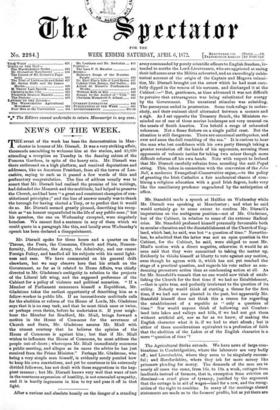After a curious and obsolete homily on the danger of
a standing army commanded by purely scientific officers to English freedom, in- tended to soothe the Lord-Lieutenants, who are aggrieved at seeing their influence over the Militia subverted, and an exceedingly unhis- torical account of the origin of the Captain and Megmra calami- ties, Mr. Disraeli brought out the arrow which he had most care- fully dipped in the venom of his sarcasm, and discharged it at the Cabinet :—" But, gentlemen, as time advanced it was not difficult to perceive that extravagance was being substituted for energy by the Government. The unnatural stimulus was subsiding. The paroxysms ended in prostration. Some took refuge in melan- choly, and their eminent chief alternated between a menace and a sigh. As I sat opposite the Treasury Bench, the Ministers re- minded me of one of those marine landscapes not very unusual on the coasts of South America. You behold a range of exhausted volcanoes. Not a flame flickers on a single pallid crest. But the situation is still dangerous. There are occasional earthquakes, and ever and anon the dull rumbling of the sea." It is curious to hear the man who lost confidence with his own party through taking a greater revolution off the hands of his opponents, accusing those opponents of volcanic tactics for taking two minor though more difficult reforms off his own hands. Note with respect to Ireland that Mr. Disraeli carefully refrains from sounding the anti-Papal string. This, taken in connection with the conversion of the John Ball, a moderate Evangelical-Conservative organ,—to the policy of granting the Irish Catholics a fair academical chance of com- bining a religious education with a good Irish degree, looks very like the conciliatory prudence engendered by the anticipation of office.


































